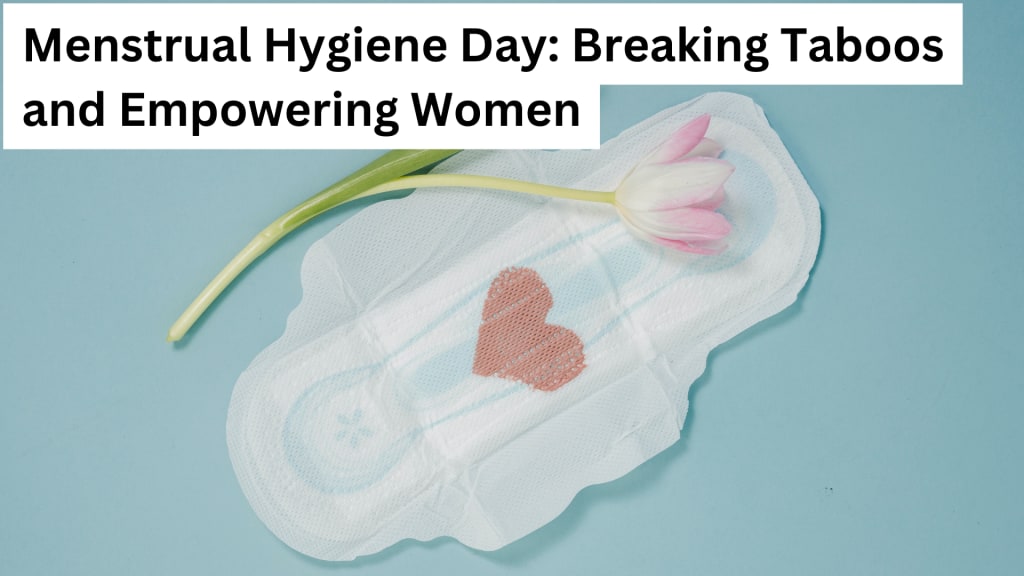Menstrual Hygiene Day: Breaking Taboos and Empowering Women
Menstrual Hygiene Day: Shattering Taboos, Empowering Women, and Promoting Equality

Introduction
Menstruation is a natural and normal biological process experienced by women around the world. Despite being a fundamental aspect of female health, menstruation has long been shrouded in secrecy, shame, and misinformation. However, with the advent of Menstrual Hygiene Day, celebrated annually on May 28th, significant strides have been made in breaking taboos, promoting awareness, and empowering women to manage their menstrual health effectively. In this article, we will delve into the importance of Menstrual Hygiene Day and the ongoing efforts to address the global challenges surrounding menstrual hygiene.
The Menstrual Hygiene Day Initiative
Menstrual Hygiene Day, initiated by the German-based NGO WASH United in 2013, aims to raise awareness about the importance of menstrual hygiene management and to advocate for improved access to menstrual products, sanitation facilities, and education. Since its inception, Menstrual Hygiene Day has gained momentum worldwide, with individuals, organizations, and governments joining forces to challenge the stigma and inequality surrounding menstruation.
Breaking the Stigma
One of the most significant achievements of Menstrual Hygiene Day is the relentless effort to break the stigma associated with menstruation. In many societies, menstruation is considered impure, dirty, or even a taboo subject. As a result, women and girls face discrimination, shame, and exclusion during their menstrual cycles. Menstrual Hygiene Day provides a platform for open conversations, education, and advocacy, creating a supportive environment for breaking these taboos and challenging societal norms.
Access to Menstrual Products
Another critical aspect of menstrual hygiene management is ensuring that women have access to safe and affordable menstrual products. Shockingly, millions of women and girls worldwide lack access to basic menstrual products, forcing them to resort to unhygienic alternatives like rags, leaves, or even ash. This not only compromises their physical health but also affects their self-esteem, education, and overall well-being. Menstrual Hygiene Day plays a vital role in highlighting these disparities and advocating for increased access to menstrual products, including reusable options and sustainable alternatives.
Sanitation Facilities and Hygiene
Maintaining proper sanitation and hygiene during menstruation is crucial for preventing infections and ensuring overall well-being. Unfortunately, many women and girls in developing countries lack access to clean and private toilets, safe water, and adequate facilities for managing their periods. This dire situation not only poses health risks but also exacerbates the stigma and discrimination surrounding menstruation. Menstrual Hygiene Day serves as a reminder of the urgent need for improved sanitation facilities and hygiene infrastructure, particularly in marginalized communities.
Education and Empowerment
Education plays a pivotal role in dismantling myths, dispelling misconceptions, and empowering women and girls with knowledge about their menstrual health. Menstrual Hygiene Day acts as a catalyst for educational initiatives that aim to teach menstruation-related topics, including menstrual hygiene, puberty, reproductive health, and menstrual rights. By providing accurate information and resources, women and girls can make informed choices, better manage their periods, and advocate for their rights. Additionally, this knowledge empowers them to pursue education, career opportunities, and personal growth without being hindered by the limitations imposed by menstruation.
Menstrual Hygiene Day: The Way Forward
While significant progress has been made in raising awareness and advocating for menstrual hygiene, many challenges persist. Governments, NGOs, and communities must continue their efforts to address these issues holistically. Here are a few essential steps to move forward:
Policy Reforms: Governments should prioritize menstrual hygiene in their public health agendas and implement policies that ensure affordable and accessible menstrual products, improved sanitation facilities, and comprehensive menstrual education.
Sustainable Solutions: Promote the use of eco-friendly menstrual products such as menstrual cups and reusable pads, reducing waste and environmental impact while increasing affordability and accessibility.
Community Engagement: Encourage open dialogue and community involvement to challenge menstrual taboos, address cultural beliefs, and foster supportive environments for women and girls during menstruation.
Men's Involvement: Engage men and boys as allies in menstrual hygiene initiatives, promoting gender equality, understanding, and empathy.
Global Collaboration: Strengthen partnerships between governments, NGOs, and international organizations to share best practices, resources, and experiences, fostering a global movement for menstrual hygiene.
Conclusion
Menstrual Hygiene Day serves as a powerful reminder that menstruation is a natural process that deserves respect, support, and empowerment. By breaking taboos, ensuring access to menstrual products and sanitation facilities, promoting education, and advocating for policy reforms, we can create a world where menstruation is celebrated rather than stigmatized. Together, let us strive for a future where every woman and girl can manage her menstrual hygiene with dignity, confidence, and freedom.
About the Creator
Plantera Digital Media
welcome to my page here i share
- Stories
- Interesting facts about the world around us
- Thought-provoking theories about the nature of reality
- Useful information that can help people in their lives






Comments
There are no comments for this story
Be the first to respond and start the conversation.